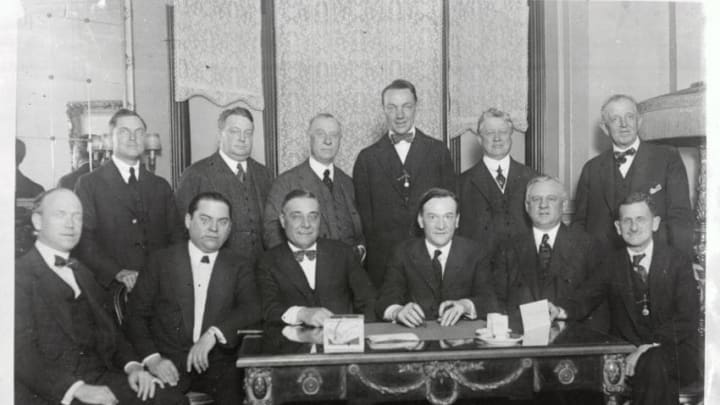An iconic manager, John McGraw was also one of the best all time general managers that the game has ever seen.
(New York Giants, 1902-32)
John McGraw is one of the legendary figures of baseball.
In his playing days during the 1890s, he was a star third baseman and personification of the rough-and-tumble, three-time champion Baltimore Orioles. He was named player-manager of the Orioles in 1899, assuming the same duties with the AL’s version of the Orioles in 1901.
But following a dispute with AL President Ban Johnson over McGraw’s profane tactics, he jumped to the National League Giants in mid-season 1902.
Andrew Freedman hired McGraw to manage the New York Giants shortly before selling the team to John Brush in 1902.
Brush, something of a martinet when he ran the Cincinnati Reds prior to buying the Giants, had the good sense to relax and let McGraw run matters on and off the field. McGraw was so good at it that he led the Giants for three decades, winning ten pennants and three World Series. Until Babe Ruth came along, he was the face of baseball in New York.
More from Call to the Pen
- Philadelphia Phillies, ready for a stretch run, bomb St. Louis Cardinals
- Philadelphia Phillies: The 4 players on the franchise’s Mount Rushmore
- Boston Red Sox fans should be upset over Mookie Betts’ comment
- Analyzing the Boston Red Sox trade for Dave Henderson and Spike Owen
- 2023 MLB postseason likely to have a strange look without Yankees, Red Sox, Cardinals
McGraw’s method lay in obtaining talent and then sitting on it. His was clearly a long-term approach, as evidenced by his ranking: 145th in total short-term improvement, but 2nd in total long-term impact. He nurtured the few stars he inherited, men such as Christy Mathewson and Joe McGinnity, building a last-place core he inherited into a pennant winner within two seasons. Following that 1904 pennant, McGraw famously refused to play the American League champion Red Sox, playing to conclusion his personal feud with Johnson.
When the Giants repeated as NL champions in 1905, McGraw agreed to play the AL champion Athletics; his Giants won in 5 games.
A scan of McGraw’s final pennant winning team, the 1924 club, illustrates his predilection for long-term construction. Among the 31 players seeing time that season, seven – Frank Frisch, Ross Youngs, Rosie Ryan, George Kelly, Irish Meusel, Frank Snyder and Artie Nehf – had been with the club for the entirety of the first four-year pennant run in NL history.
McGraw was a failure as a short-term fixer, but the talent base was so good that short-term fixes were rarely needed. His performance in that regard particularly faded following the 1924 pennant as McGraw aged and grew less tolerant, if that was possible. Following the 1925 season he traded Frisch for volatile Cardinals star Rogers Hornsby, but a year later McGraw shipped the high-maintenance Hornsby to the Boston Braves for nothing in particular.
Also at the end of 1925, McGraw let lightly used outfielder Hack Wilson walk, just in time to see Wilson blossom with the Cubs as one of the game’s great sluggers.
McGraw retired from his managerial post in 1932, leaving front office duties behind as well, and died within two years. But he did not leave the Giants in any state of disrepair. The talent bequeathed to his successor comprised the core of New York’s 1933, 1936 and 1937 National League champions: Carl Hubbell, Bill Terry, Mel Ott and Hal Schumacher. For that reason, McGraw’s average residual impact on future Giant teams is the third greatest in the game’s history.
John McGraw
In the first six categories, values reflect the standard deviation of the GM’s performance above or below the historical mean for that category. Category 7 awards or deducts points for seasons in which the GM’s short-term impact exceeded the margin by which his team either reached post-season or failed to do so. Category 8 represents post-season appearances; in categories 7 and 8 indicated points are based on numbers of teams and post-season berths.
1 Short-term average: -0.03
2 Short-term total: -0.52
3 Long-term average: +1.47
4 Long-term total: +3.76
5 Residual average: +2.26
6 Residual total: +0.77
7 GM’s post-season shares:
- 1930 penalty, -1.0. McGraw hurt the Giants by -7.2 games; they failed to qualify for post-season by 5 games. Key moves: Promoted Roy Parmelee, -1.1; acquired Hughie Critz, -3.0; acquired Wally Roettger, -1.8; acquired Pete Donohue, -1.4.
Category 7 total: -1.0.
8 Credit for post-season appearances (1904*, +1.0; 1905, +1.0; 1911, +1.0; 1912, +1.0; 1913, +1.0; 1917, +1.0; 1921, +1.0; 1922, +1.0; 1923, +1.0; 1924, +1.0): +10.00
*There was no post-season in 1904; the Giants won the National League pennant.
Grand total: +16.72.
Next: No. 4, George Weiss
